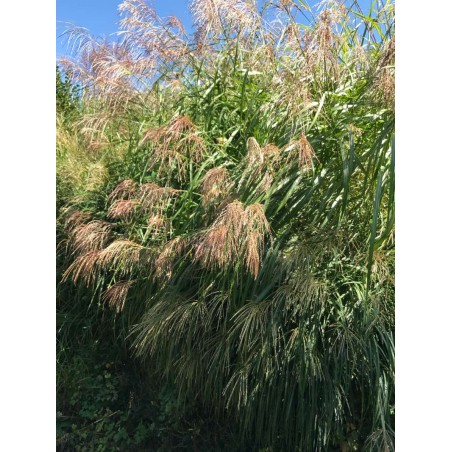










Miscanthus sinensis - Silver Grass
1 bare root plant
Also called: Eulalia, Silver Grass
This ornamental grass forms dense tufts of erect leaves with drooping ends, graceful, of a beautiful deep green, carried by thin stems highly wind resistant, at the top of which appear decorative inflorescences in late summer, composed of several upright or drooping panicles depending on the genetics of the plant
These inflorescences last throughout the fall and change into feathery and silvery spikelets which give the most beautiful aesthetic in sunlight
Miscanthus sinensis has medicinal properties: Anticoagulant, Diuretic, and Febrifuge
It is also a dye plant, traditionally used in Japan for magnificent fast yellows on wool and silk
It can be used to create composite colors (for example: oranges with Madder , greens with indigo)
In the garden, use Silver Grass as a very ornamental grass, isolated in a lawn, at the back of a bed, or to populate embankements and reduce maintenance
It can also be used as a ground cover (plant several tufts close to each other), or to form nice low seasonal hedges rapidly
Finally, it is a very interesting source of biomass for the production of mulch (very good carbon fixer)
-
| Jan | Feb | Mar | Apr | May | Jun | Jul | Aug | Sep | Oct | Nov | Dec | ||
|---|---|---|---|---|---|---|---|---|---|---|---|---|---|
| Z5 | etc. | ||||||||||||
Miscanthus sinensis is very easy to grow
The plant requires little care, is very hardy once established, withstands strong winds, and tolerates transient drought although it prefers soils with some amount of moist
Grow Silver Grass in full sun, with regular watering the first year, especially in case of drought, so that it can set its root system
In March, when the cold weather has passed, cut the clump 20cm from the ground (stems and leaves dry in winter), and use the waste as mulch in the garden or for crafts
The plant will grow back from its stump every spring
-
Learn to Use this Flavonoid Plant with our Courses:
You might also like
Payment :
PayPal < 150 €
Check < 850 €
Bank Wire > 149 €
Thank you for your kind understanding